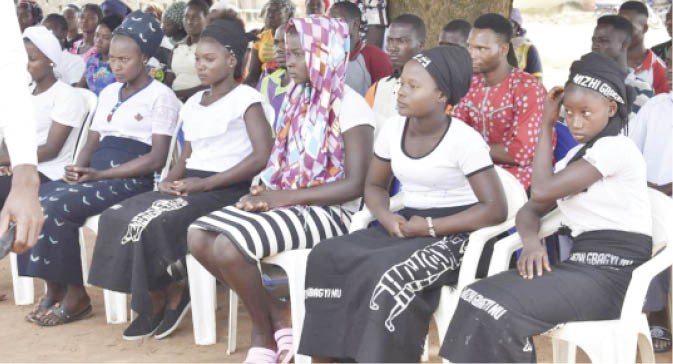Taking literacy, multilingual learning to girls at grassroots
‘If you educate a man you educate an individual but if you educate a woman you educate a whole nation’. This quote, from Ghanaian Dr James Emman Kwegyir Aggrey, has somewhat become a cliché that gives us an opportunity to reflect on the need to provide solution to the plight of women, especially here in […]

Gbagyi girls, at the 2019 International Literacy Day Celebration in Gafere communities FCT (2)
‘If you educate a man you educate an individual but if you educate a woman you educate a whole nation’. This quote, from Ghanaian Dr James Emman Kwegyir Aggrey, has somewhat become a cliché that gives us an opportunity to reflect on the need to provide solution to the plight of women, especially here in Nigeria.
Research has revealed that investing in the education of girls brings high returns in terms of breaking cycles of poverty and aiding economic growth, thereby improving children’s and women’s survival rates and health and reduction in child marriage and early pregnancies.
In celebrating the International Literacy Day, Tabitha Cumi Foundation, in collaboration with Educating Nigerian Girls in New Enterprises (ENGINE II) and Mercy Corps, visited Dafere community in Kuje Area Council in the Federal Capital Territory where they have been impacting on the lives of young girls to build their literacy level.
The executive director of the foundation, Mrs Tayo Erinle, said the day was set aside to create awareness on literacy and help people understand the need to be literate because literacy generally changes a man or woman’s life, “their perspectives, their understanding of issues and it gives them opportunity to live better lives.”
She said many girls and women dropped out of school early because of poverty, early marriage, and various other reasons but “what we are saying is that you don’t have to be literate only in English but in whatever language that you learn, that you know and you can read and write, it makes you literate.
“If women and girls at the grassroots know how to read and write not only in English language but in their local dialects, they can help their children; they can read instructions and genuinely change their lives and give them value,” she stated.
Mrs Erinle said the criteria in choosing the communities they work in was based on the underserved, adding “there is no need for all of us to be working in the city; the grassroot is where help is needed.
The programme, since inception, has impacted 5,000 women, girls and boys with evidence to show, Erinle stated.
The Director General, United Nations Educational, Scientific and Cultural Organization (UNESCO), Audrey Azoulay, in his message on the occasion of the International Literacy Day said as we celebrate the International Year of Indigenous Languages, the need to rethink literacy education is all the more pressing, considering that in 2016 only 5% of the world’s estimated 7,000 languages were present on the Internet and 50 per cent spoken.
“Our world is rich and diverse with about 7,000 living languages. These languages are instruments for communication, engagement in lifelong learning, and participation in society and the world of work. They are also closely linked with distinctive identities, cultures, worldviews, and knowledge systems,” he said.
The 2019 International Literacy Day celebrated 8th September with the theme, ‘Literacy and Multilingualism’, is an opportunity for governments, civil society and stakeholders to highlight improvements in world literacy rates, and reflect on the world’s remaining literacy challenges.
The girls of Dafere community, who showed at the celebration what they have learnt, also rendered the Nigerian national anthem in their local dialect, Gbagyi, to the admiration of those present.
